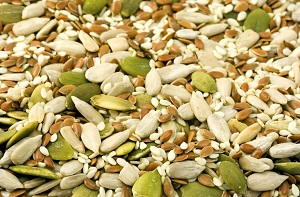
More evidence that low-calorie sweeteners are bad for your health
Studies show that artificial sweeteners can raise the risk of hypertension, metabolic syndrome, type 2 diabetes and heart disease, including stroke.

Health conscious consumers are increasingly seeking out ‘superfoods’ – food that are minimally processed and that pack more nutritional punch per gram than the usual highly processed fare you can find on the supermarket shelf.
Superfoods usually come in the shape of seeds, fruits and specially prepared powders which can be eaten on their own or incorporated into other foods and recipes.
According to a recent report by the Institute of Food Technology there are nine seeds and superfruits in particular that everyone should know more about
Chia Seeds These tiny black seeds often used in yogurt, homemade trail mixes, baked goods, commercial nutrition bars, beverages and snacks. They are high in omega-3 fatty acids, calcium, phytonutrients, vitamins, minerals and antioxidants. In fact ounce per ounce, chia seeds contain more calcium than milk. Milling the seeds has been shown to make their omega-3 alpha-linolenic acid (ALA) levels increased and eicosapentaenoic acid (EPA) significantly more available to the body.
Flaxseeds A really good source of protein, fibre, antioxidants, and phytoestrogens in the form of lignans and omega-3 fatty acids. There’s even evidence linking eating ground whole flaxseed to lowering blood cholesterol. Like chia seeds, flax seeds benefit from being milled before use to help the body absorb more of their good fats.
Sunflower seeds Often considered a traditional ballpark snack, sunflower seeds provide monounsaturated and polyunsaturated fats, protein, fibre, and phytochemicals like choline, phytosterols, phenolic acids and betaine. They are rich in protein and are an excellent source of vitamin E. In fact, 30g (1oz) of sunflower seeds provides 76% of the Recommended Dietary Allowance for vitamin E.
Pumpkin seeds More than just a crunchy salad sprinkle, pumpkin seeds are packed with fibre, manganese, magnesium, and phosphorus. They contain 8g of protein per ounce, 2 mg of iron, and 2mg of zinc, and they are cholesterol-free and allergen friendly.
Hemp seeds A good source of omega-6 linoleic acid and omega-3 linolenic acid. They also provide a source of vegetarian protein. Sprinkle hemp seeds on salads and add them to cereal and baked goods.
Blueberries Daily consumption may reduce blood pressure and arterial stiffness and are packed with fibre, vitamins, minerals, fructose, and antioxidants. A very mainstream fruit which most people can find in the supermarket, the antioxidants in blueberries are linked to the prevention/delaying of diseases such as cancer, heart disease, and the aging process.
Acai berries A rich source of anthocyanin these less well known fruits actually have a fatty acid ratio similar to olive oil. They have been shown to have anti-inflammatory properties.
Sour cherries There are two main types of sour cherries: Amarelle and Morello. Amarelle cherries, such as Montmorency, only have red pigment in the fruit skin while the fruit flesh is clear. Morello cherries have red pigment in the fruit skin and throughout the flesh. Sour cherries are high in anthocyanin and have high antioxidant activity. Reported benefits include enhanced sleep, anti-inflammation in arthritis and gout, and sports recovery. In fact studies suggest Montmorency tart cherry juice has the ability to reduce muscle pain and weakness after bouts of intense strength training, as well as after long-distance running.
Avocados More than just the main ingredient in guacamole, avocados have beneficial effects on cardio-metabolic risk factors that extend beyond their heart-healthy monounsaturated fats. In a study of 45 overweight or obese subjects who ate a moderate-fat diet including an avocado daily had lower bad cholesterol than those on a similar diet without the avocado or those on a lower-fat diet.
Cranberries These astringent fruits, native to North America have long been associated with benefiting urinary tract health but have also shown to benefit heart health, cancer prevention, oral health, and glycaemic response. Antioxidants known as polyphenols such as proanthocyanidins (PACs) in cranberries PACs have been shown to possess antimicrobial, anti-adhesion, antioxidant, and anti-inflammatory properties.

Please subscribe me to your newsletter mailing list. I have read the
privacy statement